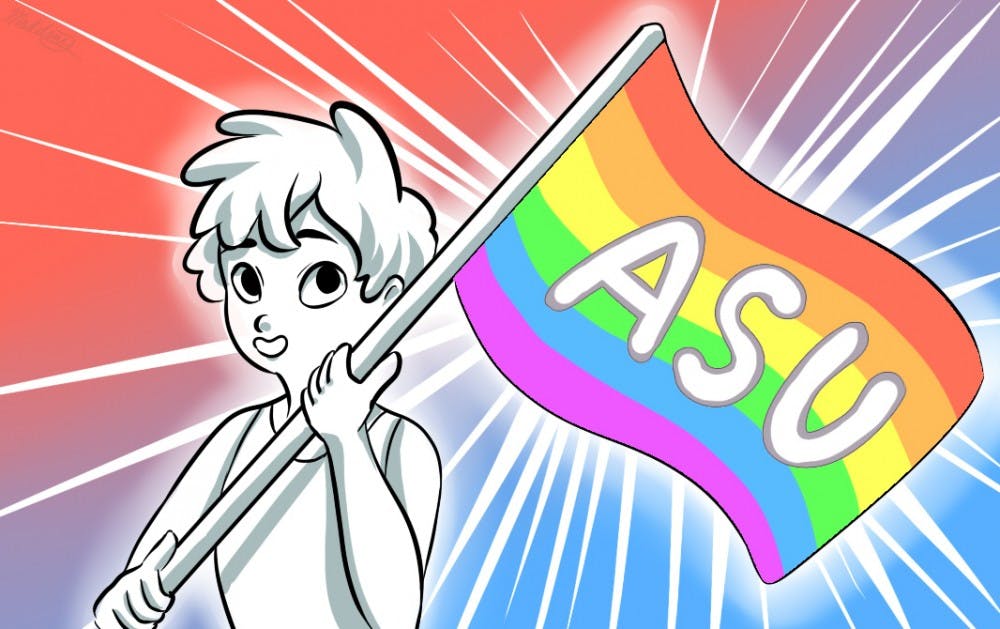Earlier this month, ASU showed support for Pride Week with events ranging from pool parties to drag shows and even a combination of the two — a dive-in drag show. In doing so, the University communicated that its LGBT+ students are not only accepted, but celebrated on campus.
ASU shows its acceptance in other ways, too, such as through LGBT scholarships, SafeZONE training to spread awareness of the community’s issues, and perhaps even subtly in its charter, which states that the institution is “measured not by whom it excludes, but by whom it includes.”
These demonstrations of encouragement are vital to LGBT+ students, especially those who come from locations or households where it’s looked down upon to not be straight and gender-conforming.
But to some, this support might be interpreted as liberal bias. In fact, a 2017 Gallup poll showed that 67 percent of Republicans polled had some or very little confidence in colleges, and many justified their belief by arguing colleges are too liberal and political. Considering the push for LGBT+ rights is strongly associated with progressive politics, a university’s support of pride might be a divisive issue.
However, despite the political history of gay, lesbian and transgender rights, the notion that supporting or opposing the LGBT+ community is political in nature should no longer be valid today.
Much like in the time of the civil rights movement, where the permittance of segregation was generally partisan in nature before becoming largely non-partisan, LGBT+ rights should now be seen as entering a new frontier, one Democrats and Republicans should support equally.
When ASU hosts Pride Week events, it supports its students, not a political message. And when people oppose demonstrations such as Pride Week, they aren’t really expressing political belief — they are utilizing politics to hide and validate their homophobia or transphobia.
At this point, supporting gay rights is no longer synonymous with a liberal affiliation. Acceptance for the LGBT+ community has gained a broader political reach than ever before.
After being asked whether it’s a valid political stance for people to disagree with the University's support for Pride Week events, Alexander Phillips, the president of ASU College Republicans, said he believes no opinion should be stifled, but he added that dissenting opinions shouldn't hurt their opposers.
However, Phillips also added that you don’t need to be a member of a particular party to support the LGBT+ community.
“Today’s culture teaches that you’re supposed to think with your affiliation, but if you do that, you’re not thinking with your brain, you’re just letting others think for you,” Phillips said. “There’s a wide spectrum of beliefs out there, and I would venture to say most people don’t fall onto just one side or the other.”
While it's true free speech is a necessary, protected right in the U.S., it doesn't mean that opinions expressed cannot be prejudiced, even if mildly so. And additionally, all Americans have the right to condemn such speech.
Jesse Avalos, the president of ASU Young Democrats, also didn’t think support for the LGBT+ community is as partisan an issue as it used to be.
“I do believe that anybody can be supportive towards the LGBT+ community,” Avalos said. “It all comes down to treating individuals with dignity and respect. Our differences should not be seen as threats, but rather an experience to learn from one another. At the end of the day acceptance is something we should strive for despite our political leanings.”
ASU’s support for its LGBT+ students shouldn’t be viewed as political — it should instead be viewed as positive support for its diverse student body. LGBT+ rights are human rights, and those are non-partisan.
Reach the columnist at jkbeneve@asu.edu or follow @JacobBenevento on Twitter.
Editor’s note: The opinions presented in this column are the author’s and do not imply any endorsement from The State Press or its editors.
Want to join the conversation? Send an email to opiniondesk.statepress@gmail.com. Keep letters under 500 words and be sure to include your university affiliation. Anonymity will not be granted.
Like The State Press on Facebook and follow @statepress on Twitter.




